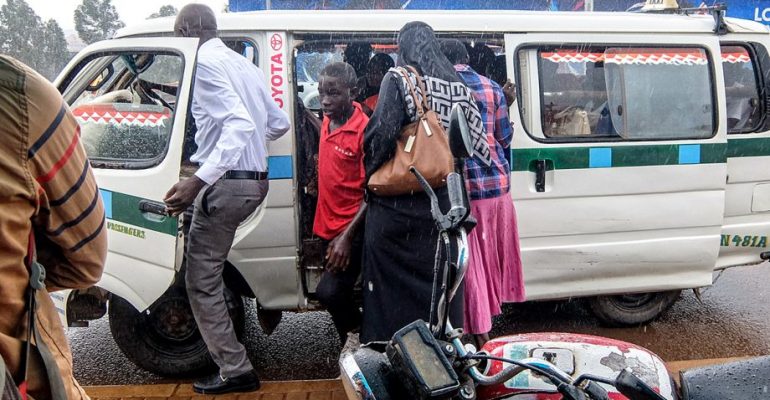Famous traffic jams of the Uganda city of Kampala are robbing some children of their sleep and dreams.
When 14-year-old Prosy Namasuga leaves home for school at 04:50, it is dark and chilly. Holding hands with her mother as they walk about 1Km to the matatu stage. They can barely see around them, but they both walk with the assurance of practised routine – they have been doing this every school day since the schools reopen and they moved to the Kisasy area of Kampala. Any delay in the routine, such as not waking up at 03:30 or a missing sock – might mean Prosy getting sucked into the frenzy of rush-hour traffic and arriving late at secondary school 18km away in the Luzira district. Many households face similar situations – and the sight of children, some as young as two, slumped inside school shuttle buses from 05:00 has become common in the city. Many working parents also rush off before dawn to drop their children at school then head off to work early so they can beat the traffic and then pick them up late in the afternoon on their return.
But experts are warning that these long hours are having an impact on the education of the children that might have lifelong consequences. Prosy and her mother walk to the matatu in the dark, using a mobile phone to light the way. “A child that is supposed to have nine to 12 hours of sleep is probably having five or seven, the child is not ready for such a lifestyle,” says Christine Angaika, a psychotherapist in Mulago Hospital. Children growing up like this develop sleeplessness, moodiness, anxiety and short-attention spans, which can lead to anxiety, depression and anger issues. Three-year-olds are too young to understand the concept of working, road traffic or even going to school, “so they don’t understand why mummy has to wake them up so early”, Mrs Christine explains. Mrs Manasuga agrees that her child’s education has been affected by waking up at 03:30. “If it weren’t for this stress, I am sure she would do better in school.”
Banker Elvina Davis lives in the Kisubi neighbourhood, along Entebbe Road, with her three-year-old son and both leave home at 04:45 for Kampala CBD – a 22km journey. Their commute takes them over the Clock Tower – notorious for traffic jams that can last up to 3 hours during peak periods when is not raining. They have to pass over it twice a day. “I had no choice but to bring him close to my workplace,” says Ms Elvina, a single mother. The other option was to enrol her son in a school in Kisubi but that would mean picking him up as late as 21:00 or 22:00. “The commute gives us time to bond. While we are stuck in traffic we can talk about our days and make plans, that is if he is not sleeping,” she says. But such a routine can have consequences, warns Mrs Christin – “By the time you are in school you are already weary from the stress to keep up with learning,” he says. Even school teachers in Kampala say they are beginning to see more and more children sleep in class or arrive at school unprepared. “They don’t do their homework because they are tired, they are not supposed to be stressed like that because they are too young,” says Mariam Lule, a teacher in the Nakasero area of Kampala. But she understands that parents have to work to provide for their families and recommends that, where possible, they opt for schools close to home and employ house helps to reduce the burden of raising children in Uganda’s capital city.

